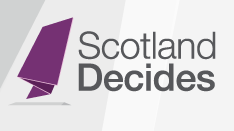 Voting got under way across Scotland at 07:00 on Thursday
Voting got under way across Scotland at 07:00 on Thursday
People in Scotland are voting on whether the country should stay in the UK or become an independent nation.
Voters will answer “Yes” or “No” to the referendum question: “Should Scotland be an independent country?”
With 4,285,323 people – 97% of the electorate – registered to vote, it is expected to be the busiest day in Scottish electoral history.
Votes will be cast at 5,579 polling stations until 22:00 on Thursday. The result is expected on Friday morning.
Strict rules mean the media / broadcasters – is not allowed to report details of campaigning until after the polls close.
 Voters formed a queue outside the polling place in Portobello, Edinburgh, before voting began
Voters formed a queue outside the polling place in Portobello, Edinburgh, before voting began Voters queue up in West Glasgow to answer the question: Should Scotland be an independent country?
Voters queue up in West Glasgow to answer the question: Should Scotland be an independent country? These voters in the south of Edinburgh were among the first to have their say on Scotland’s future
These voters in the south of Edinburgh were among the first to have their say on Scotland’s future A voter at Peebles polling station was pleased to have made his mark
A voter at Peebles polling station was pleased to have made his mark First-time voters have also been out in force, like this one at Peebles
First-time voters have also been out in force, like this one at PeeblesA number of councils around the country have said polling stations are busy, with some seeing queues both ahead of the polls opening and throughout the morning.
Stirling Council area counting officer Bob Jack said: “There were voters queuing at polling places across Stirling ahead of the polls opening at 7am. Since then, there has been a steady stream of voters and we have been very busy.”
At the scene
By BBC Scotland correspondent James Cook
It was a grey dawn in Edinburgh, the moisture clinging to the old buildings, seeping into the sandstone.
At Tollcross Primary School, the weather didn’t seem to deter the voters. The first arrived at five minutes to seven, before the polls had opened, clutching her voting card, eager to be the first to place her cross.
As the morning wore on and the darkness began to recede, the first trickle of voters became a stream.
A paramedic in his hi-vis jacket, a businessman in a smart suit, schoolteachers, a man clutching his baby to his chest; all were heading to the same destination – the ballot box for a private moment with a pencil and paper – and a choice: Yes or No.
These were personal moments, private and privileged, there was a stillness about the scene.
The airwaves, full of chatter for so long, had fallen silent as required by law. This was the moment, not for politicians or commentators, but for Scotland to speak. Tomorrow, we will find out what it said.![]()
Once the polls have closed, ballot papers will be counted in each of Scotland’s 32 local authority areas.
These will include votes cast from the 789,024 postal vote applications, which was the largest volume of registration for postal votes ever in Scotland.
After votes have been tallied, the counting officer in each area will communicate the result to the chief counting officer Mary Pitcaithly in Edinburgh.
With her approval they will then make a declaration of the result.
Once the results from all 32 local authority areas are known, Ms Pitcaithly will declare the result of the referendum at the Royal Highland Centre outside Edinburgh.
Ms Pitcaithly has said she will announce the result at “breakfast time” on Friday.
The result is most likely to be between 06:30 and 07:30, according to Elections Scotland.
That is because the final Scottish declarations in the 2010 UK parliamentary elections and the 2011 Scottish parliamentary elections declaration were made at those times respectively.
However, running totals – which can be made from the first declaration onwards – may indicate a result earlier in the morning.
Guide to referendum night
4.2m
registered voters
97%
of electorate
- 7am polls open
- 10pm polls close, counting begins
- 32 counts across Scotland
- 6:30-7:30am expected declaration
The bulk of local results are expected to come in between 03:00 and 06:00.
Because the polling stations are expected to be so busy, counting officers have put measures in place to reduce the risk of queuing.
The remote nature of some Scottish regions also means bad weather could delay the receipt of ballot boxes at counting centres, in turn delaying the national result.
Helicopters and boats are being used to transport ballot boxes to counts in areas such as Argyll and Bute.
Elections Scotland said recounts would only be allowed at a local level on the basis of concerns about process, not the closeness of a result.



